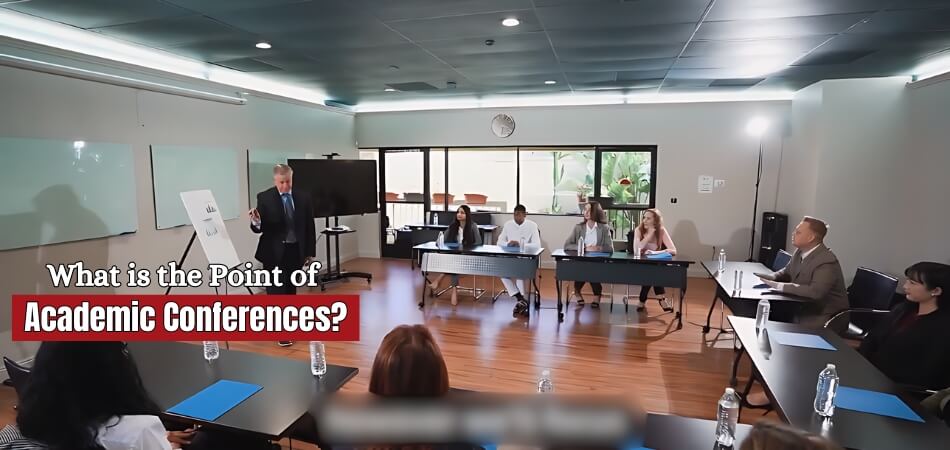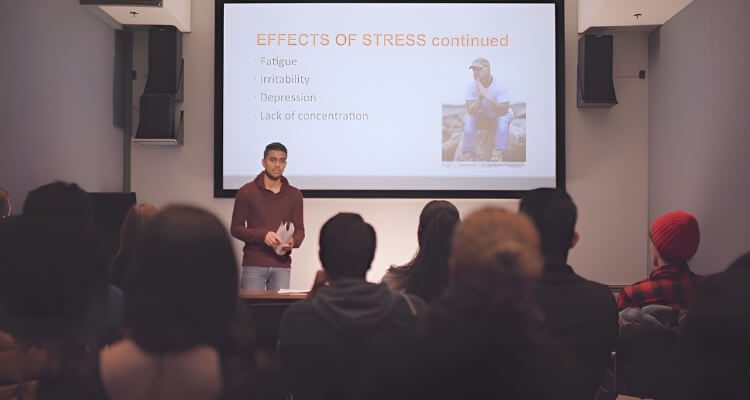Academic conferences may seem like exclusive events for scholars, but they’re much more than formal gatherings with lectures and presentations. They serve as vibrant hubs of idea exchange, innovation, and professional growth. So, what is the point of academic conferences?
At their core, these events promote collaboration, share groundbreaking research, and build meaningful connections. Participants gain access to the latest developments, enhance their skills, and expand their professional network—benefits crucial for personal and career advancement.
Curious about why they’re so impactful for attendees? Keep reading to uncover the broader purpose of academic conferences and how they can be valuable whether you’re a student, researcher, or industry expert.
The Role of Academic Conferences in Professional Growth
Academic conferences are more than just formal events—they’re transformative opportunities for professional growth. They offer a range of benefits that extend beyond knowledge sharing, promoting personal development, networking, and career advancement.
Acquiring Knowledge
Academic conferences bring together experts from diverse fields, providing attendees with the latest developments and insights. Participants can learn new theories, explore emerging trends, and understand research breakthroughs directly from the sources. This exposure helps professionals stay updated, which is essential for maintaining competence in their fields.
Networking Opportunities
One of the most valuable aspects of these conferences is the chance to meet and connect with peers, mentors, and potential collaborators. Engaging in meaningful conversations during networking sessions can lead to long-lasting professional relationships. These connections often open doors to research collaborations, job offers, and other career-development opportunities.
Skill Development
Attendees often have the chance to participate in workshops, panel discussions, and interactive sessions. These hands-on experiences help enhance soft skills like communication, presentation, and critical thinking. Additionally, attending such events can improve technical skills specific to one’s field, contributing to personal and professional growth.
Boosting Career Opportunities
Presenting at academic conferences raises a professional’s visibility in their field. It showcases expertise, credibility, and dedication, attracting potential employers, collaborators, and funding sources. The exposure and recognition gained through such events can lead to more advanced career roles and projects.
Broadening Perspectives
Conferences bring together individuals from different backgrounds and countries. Engaging with diverse perspectives broadens attendees’ understanding of global challenges and solutions, inspiring innovative approaches to their own work.
So, academic conferences provide a pathway for continuous learning and professional advancement. Whether you’re starting your career or looking to expand your horizons, these events can be invaluable.
What is the Point of Academic Conferences?
Academic conferences may seem daunting to those new to them, but they’re incredibly valuable for personal and professional development. So, what is the point of academic conferences? Below are some reasons that highlight why they matter.
Knowledge Sharing
Academic conferences bring together experts, scholars, and professionals from various fields. Attendees gain insights into the latest research, theories, and innovations. This exchange of information fosters new ideas and helps individuals stay updated with emerging trends.
Networking Opportunities
One of the core benefits of academic conferences is the chance to meet like-minded professionals. These events create a collaborative environment, making it easier to connect with peers, mentors, and potential collaborators. Networking can open doors to new projects, research opportunities, and even job offers.
Skill Development
Conferences often include workshops, hands-on sessions, and panel discussions that encourage skill development. Attendees can refine both technical and soft skills, such as public speaking, research presentation, and teamwork. To maximize these benefits, it’s important to explore upcoming conferences to attend that align with your field and interests.
Gaining Feedback on Research
For researchers, conferences offer a platform to present their work and receive constructive feedback. This feedback can come from industry experts, fellow researchers, or even students. It allows researchers to refine their work, improve methodologies, and strengthen their findings.
Professional Visibility
Presenting at academic conferences positions individuals as experts in their fields. It builds credibility and boosts personal branding within the academic community. Increased visibility can lead to invitations for collaborations, speaking engagements, and even publication opportunities.
Inspiring Innovation
Academic conferences often explore real-world problems and how to solve them. Engaging in these discussions can spark new ideas or lead to innovative solutions in various fields, such as healthcare, technology, or education. These events create a setting that encourages creative thinking and problem-solving.
Learning Beyond Your Field
While conferences focus on specific fields, they often include interdisciplinary topics. Attendees have the chance to explore ideas beyond their specialization, broadening their perspectives. This exposure can be useful for developing new research angles or integrating diverse knowledge into current work.
Career Growth
Conferences offer a clear path to career growth, whether through knowledge acquisition, new skills, or expanded networks. Attending them regularly helps professionals remain competitive in their fields. Moreover, employers often view conference participation as a commitment to ongoing professional development.
So, the purpose of academic conferences extends far beyond simple lectures. They are valuable avenues for growth, collaboration, and innovation. So, if you’re aiming to make meaningful progress in your field, these events are worth considering.
Who are the Attendees at Academic Conferences?
Academic conferences attract a diverse mix of professionals. Each group has unique reasons for attending, contributing to a rich exchange of ideas and experiences. Let’s explore the different attendees and what brings them to these events.
Researchers
Researchers are core attendees at academic conferences. They participate to share findings, gain feedback, and explore new research opportunities. Presenting their work here not only boosts their visibility but also fosters collaborations that can drive future projects.
Students
Students, especially those pursuing higher education, attend to enhance their learning. These events offer insights beyond the classroom, providing firsthand exposure to the latest trends and methodologies. Students also benefit from the opportunity for public participation in academic conferences, which promotes engagement and growth.
Industry Professionals
Professionals from various sectors attend to stay updated on current developments in their field. These events offer them practical insights that can be applied directly to their work. Additionally, they use these opportunities to identify potential collaborations and emerging trends that can drive innovation within their organizations.
Educators
Teachers, lecturers, and professors attend to update their curriculum and teaching methods. Engaging with current research helps them make classroom learning more relevant and effective. It also allows them to meet and mentor young scholars, guiding the next generation of academics.
Policy Makers
Policy makers attend conferences to gain insights that can influence decision-making. They focus on understanding how research and innovations can translate into real-world applications. By participating, they aim to create informed policies that address social, economic, or environmental issues.
These attendees bring a wide range of perspectives, making academic conferences vibrant and diverse. Regardless of your role, there’s something valuable to gain from attending.
What Types of Sessions Are Held at Academic Conferences?
A variety of sessions are offered at academic conferences, each with a specific purpose. These sessions not only adapt to diverse learning needs but also ensure dynamic engagement for participants. Let’s explore the different types of sessions you might encounter at these events.
Keynote Sessions
These are led by prominent experts who share insights on significant topics. They set the tone for the entire conference, highlighting current trends and emerging issues in the field. Keynote sessions offer inspiration, provoke thought, and provide a broad overview of the conference’s theme.
Workshops
These are hands-on sessions aimed at practical learning. They allow participants to engage actively in activities like problem-solving, role-playing, or skill-building exercises. Workshops are excellent for deepening your knowledge, gaining new skills, and applying theoretical knowledge in real-world scenarios.
Panel Discussions
Panel discussions feature a group of experts who debate specific issues or challenges. These sessions encourage diverse viewpoints, allowing attendees to hear multiple perspectives on the same topic. It’s an opportunity to understand varying ideas and approaches, enriching your understanding of complex subjects.
Poster Presentations
These sessions feature researchers displaying visual summaries of their work. Attendees can engage one-on-one with presenters, asking questions and offering feedback. Poster sessions provide an informal setting to discuss research findings and explore future collaborations.
Breakout Sessions
These are smaller, topic-specific discussions held in separate rooms. They allow participants to dive deeper into niche areas of interest, enabling focused discussions. Breakout sessions are highly interactive, often involving case studies, debates, or group activities that foster collaboration.
From keynote speeches to breakout sessions, academic conferences offer something for everyone. These sessions are designed to enrich your experience, develop your skills, and broaden your professional network.
Why Are Networking Opportunities Important at Academic Conferences?
Networking is one of the most valuable aspects of academic conferences. It goes beyond exchanging business cards; it’s about building meaningful relationships that can shape your career. Here’s why networking matters so much at these events.
- Collaboration Opportunities: Academic conferences bring together diverse professionals, researchers, and industry experts. Networking here can lead to collaborative projects, joint research papers, or even co-authored books.
- Access to Mentorship: Meeting seasoned professionals provides a chance to gain insights, seek advice, and establish mentorships. This guidance can help you navigate your career path more effectively.
- Increased Visibility: Engaging with other attendees boosts your visibility in the field. Making yourself known to industry leaders and researchers can open doors to speaking opportunities, special projects, and invitations to future events.
- Knowledge Exchange: Conversations with peers at these conferences provide exposure to new perspectives, methodologies, and the latest research trends. These informal exchanges can be as enlightening as formal presentations.
- Career Advancement: Networking can lead to direct career benefits, like job offers, research funding, or partnerships. Building a strong professional network enhances your prospects for career growth and development.
So, networking at academic conferences is more than just socializing—it’s a strategic move for personal and professional growth. It’s an opportunity to build relationships that can last long after the conference ends. Don’t miss out; be proactive, engage with others, and make every conversation count.
How to Make the Most of Your Attendance at an Academic Conference?
A conference can be a rewarding experience, but you need a strategic approach to maximize its benefits. Here’s how you can make the most of your attendance and turn the event into a valuable opportunity.
Set Clear Goals
Before attending, determine your objectives. Are you looking to learn new research, network with professionals, or find potential collaborators? Defining your goals helps you focus on relevant sessions and connect with the right people, making your time at the conference more productive.
Research the Agenda
Review the schedule beforehand to identify the sessions that align with your interests. Look up speakers and topics to plan your participation effectively.
Also, make sure you are aware of the requirements for attending academic conferences so that you can prepare all necessary documents or materials in advance. Arriving prepared will ensure you don’t miss crucial talks or workshops that could benefit your research or career.
Engage Actively
Don’t be a passive attendee; interact during sessions by asking questions or participating in discussions. Engaging with speakers and panelists not only clarifies your understanding but also makes you more noticeable among attendees. It’s a great way to leave a lasting impression.
Network Strategically
Use breaks and networking events to introduce yourself to fellow attendees, researchers, and industry experts. Start conversations by asking about their work, which can lead to meaningful discussions. Be sure to carry business cards for easy follow-up after the conference.
Take Notes
Capture key takeaways, insights, and contacts during sessions. Jot down ideas that spark your interest and strategies you might want to implement later. Organized notes will be useful for future reference and follow-ups with new connections.
By preparing well and staying engaged, you’ll turn your conference experience into a stepping stone for growth and success. So, set your goals, make meaningful connections, and learn actively to make the most of your time.
Frequently Asked Questions
While the article covers many aspects of academic conferences, there are still some common questions readers often ask. Here are additional insights that might help you understand the broader purpose of these events.
Do Academic Conferences Offer Certifications For Attendance?
Yes, many conferences provide certificates of attendance, which can be useful for professional development records. These certificates often highlight your participation and can add value to your CV. Always check with the conference organizers to confirm the availability of certificates.
Are Virtual Academic Conferences As Effective As In-Person Ones?
Virtual conferences can be effective but offer a different experience compared to in-person events. While they provide access to research presentations and discussions, networking opportunities may feel less personal. However, they are more accessible and can still help build valuable connections.
Can Students Benefit From Attending Academic Conferences?
Absolutely! Students can gain exposure to the latest research, interact with experts, and develop presentation skills. These events also offer opportunities to explore career paths, gain insights into different fields, and build a professional network early on.
Is It Necessary To Present A Paper At An Academic Conference To Attend?
No, presenting a paper is not a requirement for attending an academic conference. You can still gain insights, network with professionals, and learn from presentations. Attending without presenting can be a great way to understand the event’s format and topics before considering future presentations.
Do Academic Conferences Include Job Fairs Or Career Services?
Some conferences feature career-focused events, such as job fairs or career counseling sessions. These are especially beneficial for students and early-career researchers. It’s a good chance to connect with potential employers and learn about industry trends.
Conclusive Words
Academic conferences are more than just events—they’re gateways to professional growth, collaboration, and innovation. They bring together experts, researchers, and students eager to exchange ideas and learn. But really, what is the point of academic conferences?
The answer lies in their role as dynamic platforms for knowledge-sharing, skill development, and meaningful networking. These events spark new ideas, foster global connections, and encourage personal development, making them invaluable for anyone aiming to excel in their field.
So, whether you’re a researcher, student, or industry expert, attending academic conferences can be a transformative experience. Embrace the opportunity and see how it can impact your career progress.








